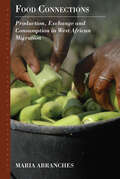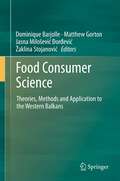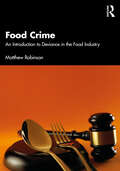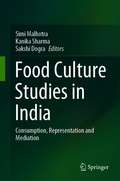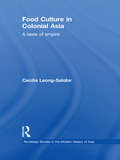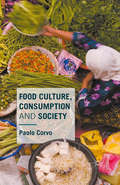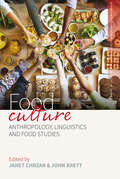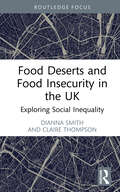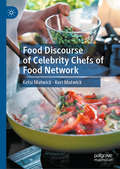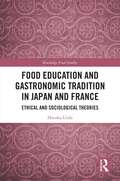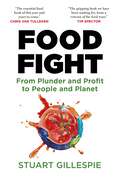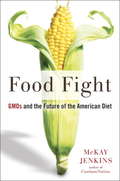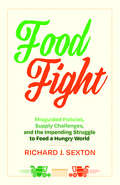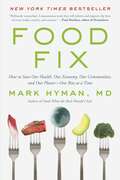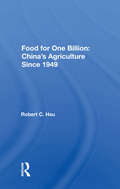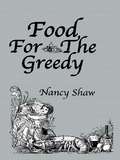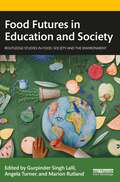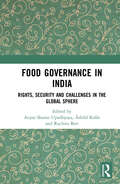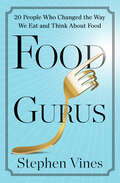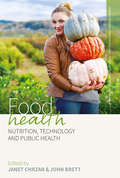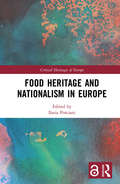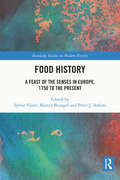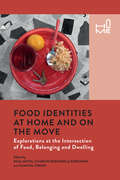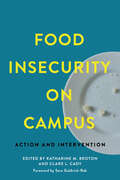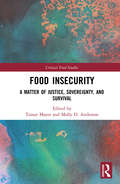- Table View
- List View
Food Connections: Production, Exchange and Consumption in West African Migration (Anthropology of Food & Nutrition #10)
by Maria AbranchesFood Connections follows the movement of food from its production sites in West Africa to its final spaces of consumption in Europe. It is an ethnographic study of economic and social life amongst a close-knit community of food producers, traders and consumers and a wide range of small intermediaries that operate in Guinea-Bissau and Portugal. By investigating the way meanings of food and land are embedded in everyday experiences and relationships in the various phases of the movement, on both sides of the migration, it reveals the connections that transnational processes of food production, exchange and consumption generate between two lifeworlds.
Food Consumer Science
by Dominique Barjolle Jasna Milošević Đorđević Žaklina Stojanović Matthew GortonThis book explores the main methods, models, and approaches of food consumer science applied to six countries of the Western Balkans, illustrating each of these methods with concrete case studies. Research conducted between 2008 and 2011 in the course of the FOCUS-BALKANS project forms an excellent database for exploring recent changes and trends in food consumption.
Food Crime: An Introduction to Deviance in the Food Industry
by Matthew RobinsonThis book addresses the various forms of deviance and criminality found within the conventional food system. This system—made up of numerous producers, processors, distributors, and retailers of food—has significant, far-reaching consequences bearing upon the environment and society.Food Crime broadly outlines the processes and impacts of this food system most relevant for the academic discipline of criminology, with a focus on the negative health outcomes of the US diet (e.g., obesity and diabetes) and negative outcomes associated with the system itself (e.g., environmental degradation). The author introduces the concept of "food criminology," a new branch of criminology dedicated to the study of deviance in the food industry. Demonstrating the deviance and criminality involved in many parts of the conventional food system, this book is the first to provide exhaustive coverage of the major issues related to what can be considered food crime. Embedded in the context of state-corporate criminality, the concepts and practices exposed in this book bring attention to harms associated with the conventional food system and illustrate the degree of culpability of food companies and government agencies for these harms.This book is of interest to students, scholars, and practitioners seeking a more just and healthy food system and encourages further future research into food crimes in the disciplines of criminology, criminal justice, and sociology.
Food Culture Studies in India: Consumption, Representation and Mediation
by Kanika Sharma Simi Malhotra Sakshi DograThis book discusses food in the context of the cultural matrix of India. Addressing topical issues in food and food culture, it explores questions concerning the consumption, representation and mediation of food. The book is divided into four sections, focusing on food fads; food representation; the symbolic valence of food; modes and manners of resistance articulated through food. Investigating consumption practices in both public and ethnic culture, each chapter introduces a fresh approach to food across diverse literary and cultural genres. The book offers a highly readable guide for researchers and practitioners in the field of literary and cultural studies, as well as the sociological fields of food studies, body studies and fat studies.
Food Culture in Colonial Asia: A Taste of Empire (Routledge Studies in the Modern History of Asia)
by Cecilia Leong-SalobirPresenting a social history of colonial food practices in India, Malaysia and Singapore, this book discusses the contribution that Asian domestic servants made towards the development of this cuisine between 1858 and 1963. Domestic cookbooks, household management manuals, memoirs, diaries and travelogues are used to investigate the culinary practices in the colonial household, as well as in clubs, hill stations, hotels and restaurants. Challenging accepted ideas about colonial cuisine, the book argues that a distinctive cuisine emerged as a result of negotiation and collaboration between the expatriate British and local people, and included dishes such as curries, mulligatawny, kedgeree, country captain and pish pash. The cuisine evolved over time, with the indigenous servants preparing both local and European foods. The book highlights both the role and representation of domestic servants in the colonies. It is an important contribution for students and scholars of food history and colonial history, as well as Asian Studies.
Food Culture, Consumption and Society
by Paolo CorvoThis book analyses how consumer food choices have undergone profound changes in the context of the economic crisis, including the rediscovery of local products and the diffusion of multi-ethnic food. Corvo argues that a new ecological relationship between food and the environment is needed to reduce food problems such as food waste and obesity.
Food Culture: Anthropology, Linguistics and Food Studies (Research Methods for Anthropological Studies of Food and Nutrition #2)
by John Brett Janet ChrzanThis volume offers a comprehensive guide to methods used in the sociocultural, linguistic and historical research of food use. This volume is unique in offering food-related research methods from multiple academic disciplines, and includes methods that bridge disciplines to provide a thorough review of best practices. In each chapter, a case study from the author's own work is to illustrate why the methods were adopted in that particular case along with abundant additional resources to further develop and explore the methods.
Food Deserts and Food Insecurity in the UK: Exploring Social Inequality (Routledge Focus on Environment and Sustainability)
by Claire Thompson Dianna SmithThis book examines the social inequalities relating to food insecurity in the UK, as well as drawing parallels with the US. Access to food in the UK, and especially access to healthy food, is a constant source of worry for many in this wealthy country. Crises, such as the COVID-19 pandemic, have coincided with a steep rise in the cost of living, meaning household food insecurity has become a reality for many more households. This book introduces a new framework to examine the many influences on local-level food inequalities, whether they result from individual circumstances or where a person lives. The framework will allow researchers new to the field to consider the many influences on food security, and to support emerging research around different sub-topics of food access and food security. Providing a thorough background to two key concepts, food deserts and food insecurity, the book documents the transition from area-based framing of food resources, to approaches which focus on household food poverty and the rise of food banks. The book invites researchers to acknowledge and explore the ever changing range of place-based factors that shape experiences of food insecurity: from transport and employment to rural isolation and local politics. By proposing a new framework for food insecurity research and by drawing on real-world examples, this book will support academic and applied researchers as they work to understand and mitigate the impacts of food insecurity in local communities. This book will be of great interest to students and scholars of food and nutrition security, public health, and sociology. It will also appeal to food policy professionals and policymakers who are working to address social inequalities and improve access to healthy and nutritious food for all.
Food Discourse of Celebrity Chefs of Food Network
by Kelsi Matwick Keri MatwickFood Discourse explores a fascinating, yet virtually unexplored research area: the language of food used on television cooking shows. It shows how the discourse of television cooking shows on the American television channel Food Network conveys a pseudo-relationship between the celebrity chef host and viewers. Excerpts are drawn from a variety of cooking show genres (how-to, travel, reality, talk, competition), providing the data for this qualitative investigation. Richly interdisciplinary, the study draws upon discourse analysis, narrative, social semiotics, and media communication in order to analyze four key linguistic features – recipe telling, storytelling, evaluations, and humor – in connection with the themes of performance, authenticity, and expertise, essential components in the making of celebrity chefs. Given its scope, the book will be of interest to scholars of linguistics, media communication, and American popular culture. Further, in light of the international reach and influence of American television and celebrity chefs, it has a global appeal.
Food Education and Gastronomic Tradition in Japan and France: Ethical and Sociological Theories (Routledge Food Studies)
by Haruka UedaDrawing on ethical and sociological theories of food, this book presents a new approach to food education that moves beyond nutrition-centred education. Food education has gained increasing scientific and political importance in many countries as a promising way to change contemporary eating. However, many practices fail to address two epistemological obstacles regarding its very components – ‘food’ and ‘education’. Food has largely been thought of from a nutritionistic viewpoint alone and the ethical issues over children’s freedom of choice and well-being have been absent. This book resolves these problems by applying ethical and sociological theories of food and analysing food education in two pioneering countries: Japan and France. The book focuses on taste education and gastronomy as two key concepts which have great potential to positively impact food education. Taste education is a promising alternative to nutrition-centred pedagogy which foregrounds the experience and pleasure of eating food, creating an environment for taste sensibility and food curiosity. From taste education, the picture can be broadened to examine the role and impact of gastronomy in food education. Examining the cultural traditions of France and Japan reveals how gastronomy can impact eating habits and food cultures and how these criteria should be an intrinsic part of food education. The book concludes by constructing an integrative theory for food education that moves beyond nutrition-centred education for the benefit of one’s well-being. This book will greatly interest students, scholars, policymakers and educators working on food education, food-related issues at the intersection between nutritional and social sciences, and ‘gastronomes’ searching for a pedagogical guide for developing their capabilities to eat in a more humanistic way.
Food Fight: From Plunder and Profit to People and Planet
by Stuart GillespieUsing decades of research and insight gathered from around the world, health and nutrition expert Stuart Gillespie reimagines our global food system, plotting a way forward for a sustainable, equitable, and healthy food future Food is life, but our food system is killing us. Designed in a different century for a different purpose—to mass-produce cheap calories to prevent famine—it’s now generating obesity and ill-health and driving the climate crisis. We need to transform it into one that can nourish all eight billion of us and the planet we live on. In Food Fight, Stuart Gillespie shares the insights he’s gleaned over a forty-year career in food, nutrition, and health, revealing how the global food system we once relied upon for nutrition has warped into the very thing making us sick. Many of us are now simultaneously overweight and undernourished. From its origins in colonial plunder through to the past few decades of neo-liberalism, our food system now lies in the tight grip of a handful of powerful transnational corporations that are playing for profit at any cost—aided by governments who let them get away with it. With his eye trained on solutions within our grasp, Gillespie also celebrates success stories from around the world, driven by remarkable citizens, social movements, policy makers, and politicians. These case studies offer hope that, by organizing, sharing, and learning, we can build a better food future for ourselves and for our children. Both unflinching exposé and revolutionary call to arms, Food Fight shines a light inside the black box of politics and power before mapping a way toward a new system that gives us hope for a future of global health and justice.
Food Fight: GMOs and the Future of the American Diet
by Mckay JenkinsAre GMOs really that bad? A prominent environmental journalist takes a fresh look at what they actually mean for our food system and for us. In the past two decades, GMOs have come to dominate the American diet. Advocates hail them as the future of food, an enhanced method of crop breeding that can help feed an ever-increasing global population and adapt to a rapidly changing environment. Critics, meanwhile, call for their banishment, insisting GMOs were designed by overeager scientists and greedy corporations to bolster an industrial food system that forces us to rely on cheap, unhealthy, processed food so they can turn an easy profit. In response, health-conscious brands such as Trader Joe’s and Whole Foods have started boasting that they are “GMO-free,” and companies like Monsanto have become villains in the eyes of average consumers.Where can we turn for the truth? Are GMOs an astounding scientific breakthrough destined to end world hunger? Or are they simply a way for giant companies to control a problematic food system? Environmental writer McKay Jenkins traveled across the country to answer these questions and discovered that the GMO controversy is more complicated than meets the eye. He interviewed dozens of people on all sides of the debate—scientists hoping to engineer new crops that could provide nutrients to people in the developing world, Hawaiian papaya farmers who credit GMOs with saving their livelihoods, and local farmers in Maryland who are redefining what it means to be “sustainable.” The result is a comprehensive, nuanced examination of the state of our food system and a much-needed guide for consumers to help them make more informed choices about what to eat for their next meal. From the Hardcover edition.
Food Fight: Misguided Policies, Supply Challenges, and the Impending Struggle to Feed a Hungry World
by Richard J. SextonSociety's most basic challenge is arguably to produce and distribute enough food for its citizens. In 2023, 733 million people faced hunger and 2.3 billion were moderately or severely food insecure. Feeding a growing world population is becoming more difficult in the face of climate change, pest resistance to traditional treatments, and misguided government policies that limit how much food ends up on our plates. Policies to support biofuels, organic agriculture, local foods, and small farms and to oppose genetically modified foods all reduce food production on existing land. This leads to higher food prices, increased carbon emissions, and less natural habitat as cropland expands. Food Fight documents the challenges to adequately feeding the world in the twenty-first century and illustrates the ways in which contemporary food policies in the United States, Europe, and beyond imperil food security. Richard J. Sexton provides a window into the world of modern agriculture and food supply chains. He separates the wheat from the chaff to distinguish policies that will limit, or expand, the global food supply, and he explains how we can construct a food system that forestalls future hunger and environmental degradation.
Food Fix: How to Save Our Health, Our Economy, Our Communities, and Our Planet--One Bite at a Time
by Dr. Mark HymanHelp to transform the planet in crisis with this indispensable guide to healthy, ethical, and economically sustainable food from #1 New York Times bestselling author Mark Hyman, MD -- "Read this book if you're ready to change the world" (Tim Ryan, US Representative).Food is our most powerful tool to reverse the global epidemic of chronic disease, heal the environment, reform politics, and revive economies. What we eat has tremendous implications not just for our waistlines, but also for the planet, society, and the global economy. What we do to our bodies, we do to the planet; and what we do to the planet, we do to our bodies.In Food Fix, #1 bestselling author Mark Hyman explains how our food and agriculture policies are corrupted by money and lobbies that drive our biggest global crises: the spread of obesity and food-related chronic disease, climate change, poverty, violence, educational achievement gaps, and more.Pairing the latest developments in nutritional and environmental science with an unflinching look at the dark realities of the global food system and the policies that make it possible, Food Fix is a hard-hitting manifesto that will change the way you think about -- and eat -- food forever, and will provide solutions for citizens, businesses, and policy makers to create a healthier world, society, and planet.
Food For One Billion: China's Agriculture Since 1949
by Robert C. HsuThis book examines the agricultural policies and programs adopted by the Chinese leadership since 1949 and analyzes the role of agriculture in China's changing development strategies. Dr. Hsu gives particular attention to the measures intended to improve agricultural technology and to the sources of funds for agricultural investment. He concludes that, although the collective system has been effective in mobilizing China's rural resources for agricultural development and in promoting progress in labor-intensive agricultural technology, periodic extreme leftist policies and interference by rural party cadres have caused various kinds of inefficiency, offsetting the advantages gained from collective farming. This is the first book to systematically analyze the ways in which China's agricultural development is being financed. By critically examining the level and nature of state resources allocated to agriculture, the author challenges the view that China has pursued an agriculture-first strategy of economic development since the early 1960s.
Food For The Greedy
by ShawFirst published in 2005. Routledge is an imprint of Taylor & Francis, an informa company.
Food Futures in Education and Society (Routledge Studies in Food, Society and the Environment)
by Angela Turner Gurpinder Singh Lalli Marion RutlandThis book brings together a unique collection of chapters to facilitate a broad discussion on food education that will stimulate readers to think about key policies, recent research, curriculum positions and how to engage with key stakeholders about the future of food. Food education has gained much attention because the challenges that influence food availability and eating in schools also extend beyond the school gate. Accordingly, this book establishes evidence-based arguments that recognise the many facets of food education, and reveal how learning through a future's lens and joined-up thinking is critical for shaping intergenerational fairness concerning food futures in education and society. This book is distinctive through its multidisciplinary collection of chapters on food education with a particular focus on the Global North, with case studies from England, Australia, the Republic of Ireland, the United States of America, Canada and Germany. With a focus on three key themes and a rigorous food futures framework, the book is structured into three sections: (i) food education, pedagogy and curriculum, (ii) knowledge and skill diversity associated with food and health learning and (iii) food education inclusivity, culture and agency. Overall, this volume extends and challenges current research and theory in the area of food education and food pedagogy and offers insight and tangible benefits for the future development of food education policies and curricula. This book will be of great interest to students, scholars, policymakers and education leaders working on food education and pedagogy, food policy, health and diet and the sociology of food.
Food Governance in India: Rights, Security and Challenges in the Global Sphere
by Anjoo Sharan Upadhyaya, Åshild Kolås and Ruchita BeriThis book offers insights into the issues around food security, public health, equity and global governance. With a focus on India, it highlights the complex networks of sociopolitical, economic and agricultural challenges to ensure self-sufficiency in food production. Based on field research conducted across India and an in-depth study on government agencies and multilateral fora, this book connects and juxtaposes global, national and local narratives on food security and policy. It analyses issues ranging from climate change to gaps in the nation-wide public food distribution systems. Through interdisciplinary narratives on food insecurity and poverty, the book exposes the underlying problems within policy frameworks and offers solutions for greater accessibility and distribution of food supplies while combating climate variability and agrarian distress. The volume explores global food governance norms and India’s role in further shaping them. It will be of interest to students and researchers of public policy and governance, development studies, sociology, agriculture studies, public health and nutrition and economics.
Food Gurus: 20 People Who Changed the Way We Eat and Think About Food
by Stephen VinesA fascinating overview of culinary history exploring the lives of twenty people who have impacted the way we dine. &“An intriguing dip into the lives and obsessions of an eclectic round up of ancient and modern food heroes whose tastes affect ours. Easy to digest, great recipes and some surprises.&” —Lindsey Bareham, The Times (London) Centuries ago, humankind thought of food as mere sustenance, but over time, it has evolved into something bigger. Now single dishes and entire cuisines can become trendy, cultural phenomena and media obsessions around the world. Why? How did we get here? Throughout history, there have been individuals who, for better or worse, have transformed how we eat and how we think about what we eat. In Food Gurus, author Stephen Vines delves into the culinary past and examines the careers and legacies of twenty of these influential people. They are chefs, writers, entrepreneurs, and other icons of the food world. Vines discusses each guru&’s personal journey, their character and passion, and the social events and history that shaped their approach to food. There are even recipes to better illustrate the type of cooking they produced—or had someone make for them. Among the gurus are the inventor of molecular gastronomy, Ferran Adria; one of Britain&’s most influential cookery writers, Isabella Beeton; the &“mother of American cooking&” and voice for sustainable agriculture, Alice Waters; and food industry innovator and entrepreneur Henry Heinz. Other featured gurus include: Robert Atkins James Beard Paul Bocuse Antonin Carême Julia Child Elizabeth David Raymond &“Ray&” Kroc Catherine de Medici Jamie Oliver Gordon Ramsay And more! Whether you enjoy history, eating, or sociology, Food Gurus has something to sate your appetite. &“[Vines&’s] choice of gurus is canny, amusing and well-researched, telling the reader not only about his heroes&’ virtues but also their clay feet.&” —Paul Levy, co-author of The Official Foodie Handbook
Food Health: Nutrition, Technology, and Public Health (Research Methods for Anthropological Studies of Food and Nutrition #3)
by John Brett Janet ChrzanNutritional Anthropology and public health research and programming have employed similar methodologies for decades; many anthropologists are public health practitioners while many public health practitioners have been trained as medical or biological anthropologists. Recognizing such professional connections, this volume provides in-depth analysis and comprehensive review of methods necessary to design, plan, implement and analyze public health programming using anthropological best practices. To illustrates the rationale for use of particular methods, each chapter elaborates a case study from the author's own work, showing why particular methods were adopted in each case.
Food Heritage and Nationalism in Europe (Critical Heritages of Europe)
by Ilaria PorcianiFood Heritage and Nationalism in Europe contends that food is a fundamental element of heritage, and a particularly important one in times of crisis. Arguing that food, taste, cuisine and gastronomy are crucial markers of identity that are inherently connected to constructions of place, tradition and the past, the book demonstrates how they play a role in intangible, as well as tangible, heritage. Featuring contributions from experts working across Europe and beyond, and adopting a strong historical and transnational perspective, the book examines the various ways in which food can be understood and used as heritage. Including explorations of imperial spaces, migrations and diasporas; the role of commercialisation processes, and institutional practices within political and cultural domains, this volume considers all aspects of this complex issue. Arguing that the various European cuisines are the result of exchanges, hybridities and complex historical processes, Porciani and the chapter authors offer up a new way of deconstructing banal nationalism and of moving away from the idea of static identities. Suggesting a new and different approach to the idea of so-called national cuisines, Food Heritage and Nationalism in Europe will be a compelling read for academic audiences in museum and heritage studies, cultural and food studies, anthropology and history. Chapters 1,2,4,6 and 12 of this book are available for free in PDF format as Open Access from the individual product page at www.routledge.com. They have been made available under a Creative Commons Attribution-Non Commercial-No Derivatives 4.0 license
Food History: A Feast of the Senses in Europe, 1750 to the Present (Routledge Studies in Modern History)
by Martin Bruegel Peter J. Atkins Sylvie VabreThis pioneering book elevates the senses to a central role in the study of food history because the traditional focus upon food types, quantities, and nutritional values is incomplete without some recognition of smell, touch, sight, hearing, and taste. Eating is a sensual experience. Every day and at every meal the senses of smell, touch, sight, hearing, and taste are engaged in the acts of preparation and consumption. And yet these bodily acts are ephemeral; their imprint upon the source material of history is vestigial. Hitherto historians have shown little interest in the senses beyond taste, and this book fills that research gap. Four dimensions are treated: • Words, Symbols and Uses: Describing the Senses – an investigation of how specific vocabularies for food are developed. • Industrializing the Senses – an analysis of the fundamental change in the sensory qualities of foods under the pressure of industrialization and economic forces outside the control of the household and the artisan producer. • Nationhood and the Senses – an exploration of how the combination of the senses and food play into how nations saw themselves, and how food was a signature of how political ideologies played out in practical, everyday terms. • Food Senses and Globalization – an examination of links between food, the senses, and the idea of international significance. Putting all of the senses on the agenda of food history for the first time, this is the ideal volume for scholars of food history, food studies and food culture, as well as social and cultural historians. Putting all of the senses on the agenda of food history for the first time, this is the ideal volume for scholars of food history, food studies and food culture, as well as social and cultural historians.
Food Identities at Home and on the Move: Explorations at the Intersection of Food, Belonging and Dwelling (Home Ser.)
by Raúl Matta Charles-Édouard de Suremain Chantal CrennHow does food restore the fragmented world of migrants and the displaced? What similar processes are involved in challenging, maintaining or reinforcing divisions between groups coexisting in the same living place? Food Identities at Home and on the Move examines how ‘home’ is negotiated around food in the current worldwide context of uncertainty, mobility and displacement. Drawing on empirical approaches to heritage, identity and migration studies, the contributors analyse the relationship between food and the various understandings of home and dwelling. With case studies on sushi around the world, food as heritage in the Afghan diaspora and Mexican foodways in Chicago, these chapters offer novel readings on the convergence of food and migration studies, the anthropology of space and place and the field of mobility by focusing on how entangled stories of food and home are put on display for constructing the present and imagining the future.
Food Insecurity on Campus: Action and Intervention
by Katharine M. Broton and Clare L. CadyThe hidden problem of student hunger on college campuses is real. Here's how colleges and universities are addressing it.As the price of college continues to rise and the incomes of most Americans stagnate, too many college students are going hungry. According to researchers, approximately half of all undergraduates are food insecure. Food Insecurity on Campus—the first book to describe the problem—meets higher education's growing demand to tackle the pressing question "How can we end student hunger?" Essays by a diverse set of authors, each working to address food insecurity in higher education, describe unique approaches to the topic. They also offer insights into the most promising strategies to combat student hunger, including• utilizing research to raise awareness and enact change; • creating campus pantries, emergency aid programs, and meal voucher initiatives to meet immediate needs;• leveraging public benefits and nonprofit partnerships to provide additional resources;• changing higher education systems and college cultures to better serve students; and• drawing on student activism and administrative clout to influence federal, state, and local policies.Arguing that practice and policy are improved when informed by research, Food Insecurity on Campus combines the power of data with detailed storytelling to illustrate current conditions. A foreword by Sara Goldrick-Rab further contextualizes the problem. Offering concrete guidance to anyone seeking to understand and support college students experiencing food insecurity, the book encourages readers to draw from the lessons learned to create a comprehensive strategy to fight student hunger.Contributors: Talia Berday-Sacks, Denise Woods-Bevly, Katharine M. Broton, Clare L. Cady, Samuel Chu, Sarah Crawford, Cara Crowley, Rashida M. Crutchfield, James Dubick, Amy Ellen Duke-Benfield, Sara Goldrick-Rab, Jordan Herrera, Nicole Hindes, Russell Lowery-Hart, Jennifer J. Maguire, Michael Rosen, Sabrina Sanders, Rachel Sumekh
Food Insecurity: A Matter of Justice, Sovereignty, and Survival (Critical Food Studies)
by Tamar MayerThis book explores the experiences, causes, and consequences of food insecurity in different geographical regions and historical eras. It highlights collective and political actions aimed at food sovereignty as solutions to mitigate suffering. Despite global efforts to end hunger, it persists and has even increased in some regions. This book provides interdisciplinary and historical perspectives on the manifestations of food insecurity, with case studies illustrating how people coped with violations of their rights during the war-time deprivation in France; the neoliberal incursions on food supply in Turkey, Greece, and Nicaragua; as well as the consequences of radioactive contamination of farmland in Japan. This edited collection adopts an analytical approach to understanding food insecurity by examining how the historical and political situations in different countries have resulted in an unfolding dialectic of food insecurity and resistance, with the most marginalized people—immigrants, those in refugee camps, poor peasants, and so forth—consistently suffering the worst effects, yet still maintaining agency to fight back. The book tackles food insecurity on a local as well as a global scale and will thus be useful for a broad range of audiences, including students, scholars, and the general public interested in studying food crises, globalization, and current global issues.
